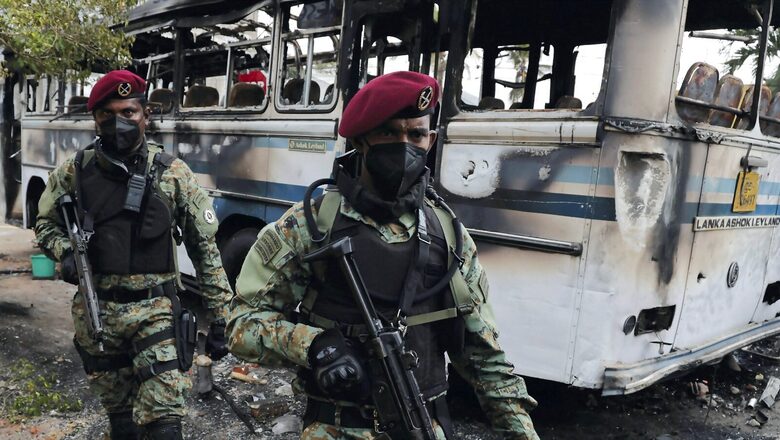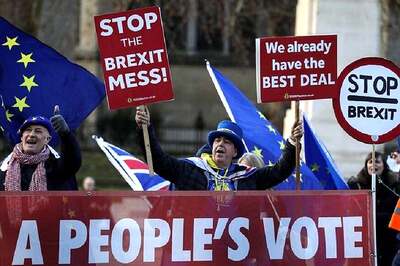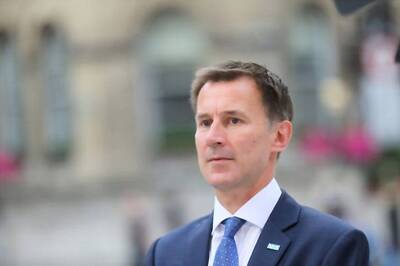
views
As economic crisis deepens and protests grew, dozens of Sri Lankan lawmakers on Tuesday walked out of the ruling coalition, leaving President Gotabaya Rajapaksa’s government in a minority in Parliament. The island country is facing acute shortage of food, fuel and other essentials along with record inflation and crippling power cuts which led to massive protests by citizens against the government.
On Monday, Rajapaksa dissolved his cabinet and sought to form a unity government as public unrest surged over the ruling family’s handling of the debt-heavy economy. Crowds have since the weekend attempted to storm the homes of several senior government officials.
CNN-News18 reporters in Sri Lanka also saw stores which were empty and there were no customers inside them. There were several stores where essential food items and pulses were highly priced. A doctors’ body also told the government there was an acute shortage of medicines that could collapse the health system.
Street demonstrations against the food and fuel shortages, triggered by a lack of foreign exchange for imports, began last month but have intensified in recent days, leading to clashes between protesters and police in some instances. Several protesters peacefully gathered near the residence of the Prime Minister on March 29. Despite the declaration of a state of emergency and a weekend curfew, people joined the protests calling for the resignation of Rajapaksa.
Here are some of the top developments from crisis-hit Sri Lanka:
- In a major setback for the administration, Finance Minister Ali Sabry resigned a day after his appointment and ahead of crucial talks scheduled with the International Monetary Fund (IMF) for a loan programme. “At this crucial juncture the country needs stability to weather the current financial crisis and difficulties,” he said in the letter seen by Reuters, also offering to resign from his parliamentary seat if the president wanted to bring in someone from outside to replace him.
- Former finance minister Basil Rajapaksa was spotted sitting silently inside the Parliament. Basil was accused of fleeing the nation and returning to the United States when he was not seen in public as Sri Lanka slumped into an economic crisis.
- Sri Lanka opposition leader Sajith Premadasa urged the Parliament to abolish the executive presidency and said that he and his party Samagi Jana Balawegaya (SJB) will not accept any ministerial position and said that the voices on the streets should be heard.
- More than 60 people had been arrested in connection with unrest since Friday and many have said they were tortured in police custody.
- The UN Human Rights Council said it was closely watching the deteriorating situation in Sri Lanka, which is already facing international censure over its human rights record. “The drift towards militarisation and the weakening of institutional checks and balances in Sri Lanka have affected the state’s ability to effectively tackle the economic crisis,” the UNHRC said.
- Sri Lanka has decided to temporarily shut its embassies in Norway and Iraq, as well as the country’s Consulate General in Sydney. A statement from the Ministry of Foreign Affairs said the decision will take effect from April 30. It said the decision of temporary closure of the two embassies and a consulate by the government came after careful deliberation and was part of a general restructuring of Sri Lanka’s diplomatic representation overseas.
- “If we don’t act now, there will be a river of blood in the country,” said Wijeyadasa Rajapakshe, a newly independent lawmaker who broke ranks with the president’s party and joined calls for the leader to step down. “We have to forget party politics and ensure an interim government.”
- Defence secretary Kamal Gunaratna warned that people resorting to violence will not be spared by security forces. He said that democratic protests will be allowed but urged people to not resort to violence.
- President Rajapaksa has defended his government’s actions, saying the foreign exchange crisis was not his making and the economic downturn was largely pandemic driven with the island nation’s tourism revenue and inward remittances waning.
- India recently announced to extend a USD 1 billion line of credit to Sri Lanka as part of its financial assistance to the country to deal with the economic crisis following a previous USD 500 billion line of credit in February to help it purchase petroleum products. During his recently-concluded visit to Colombo, External Affairs Minister S Jaishankar had assured India’s continued support in Sri Lanka’s economic recovery process.
(with inputs from Reuters and AFP)
Read the Latest News and Breaking News here




















Comments
0 comment